In an era of hyperconnectivity, screen time has become a defining feature – and struggle – of family life. Parents have to consider not only their own habits but the digital boundaries they set for their children. This chapter explores how screen time fits into the broader landscape of parenting kids ages 12 and younger.
Among the key findings from this chapter:
- Parents are juggling a lot: Managing screen time is a priority for most, but fewer say it’s the biggest priority.
- Some parents think they could handle screen time better: 42% of parents think they could do a better job managing their child’s screen time. While a quarter say so about a child under 2, that rises to 47% of those with an 8- to 12-year-old.
- Most parents have rules around screens: 86% of parents say so, but fewer say they stick to their rules all the time (19%).
Screen time management
From bedtime routines to screen time limits, parents juggle it all. Public health officials have raised alarms about the mounting pressures parents face. The U.S. Surgeon General’s 2024 advisory called attention to these stressors and their impact.
To better understand where screen time ranks among parents’ other duties, we asked parents about five priorities when it comes to raising their child.
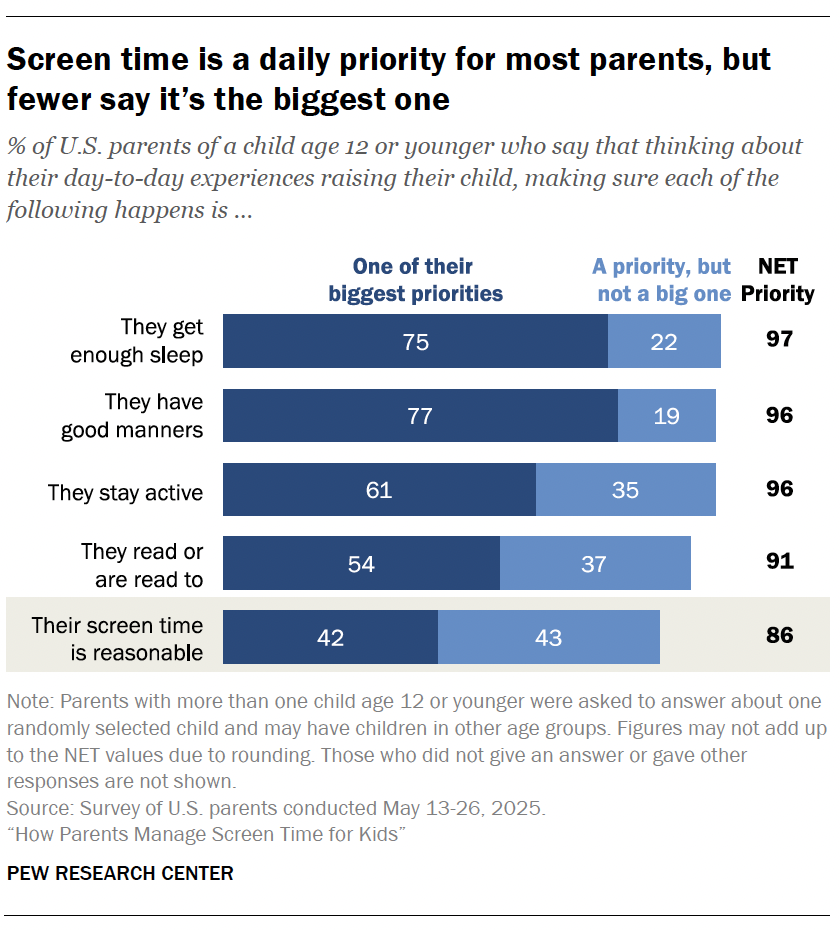
The vast majority of parents (86%) say making sure their child’s screen time is reasonable is a day-to-day priority. This includes 42% who say it’s one of their biggest priorities.
But greater shares of parents point to other priorities. For example:
- 77% say making sure their child has good manners is one of their biggest priorities.
- 75% say the same about their child getting enough sleep.
- 61% say a main objective is keeping their child active.
- 54% say this about them reading or being read to.
Managing kids’ screen time
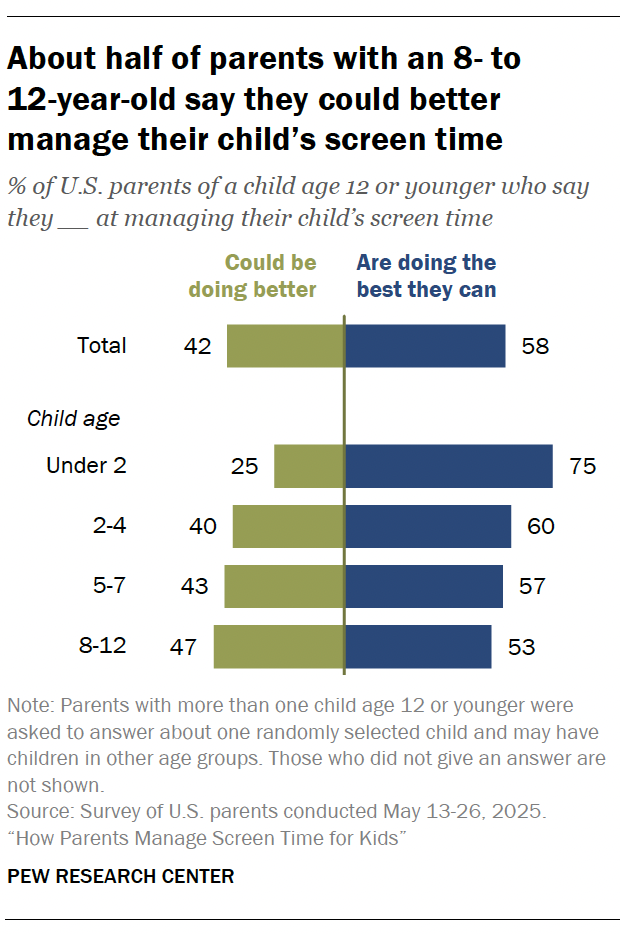
How do parents think they’re doing when it comes to managing their child’s screen time?
A majority of parents say they are doing the best they can. However, roughly four-in-ten think they could be doing better.
By child age
Parents are more likely to see ways they could improve if they have a child 2 and up, versus under 2. While a quarter say they could be doing better for their child under 2, this rises to four-in-ten of those with a child age 2 to 4 and is similar – 43% – for parents with a child age 5 to 7.
Roughly half (47%) say they could be doing better at managing their 8- to 12-year-old’s screen time.
Parents feeling judged on kids’ screen time
Parenting in the digital age comes with its own set of critics, and some feel the weight of judgment when it comes to decisions about their kid’s use of screens.
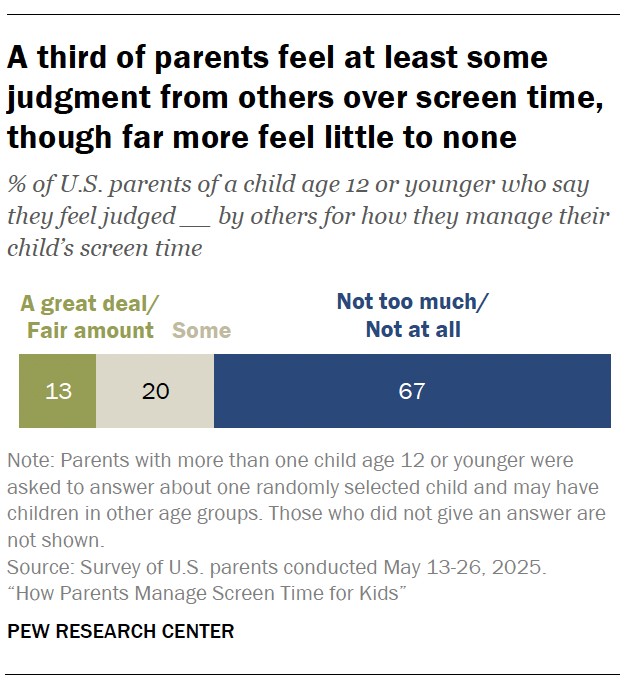
A third of parents feel at least some judgment from others for how they manage their child’s screen time. This includes 13% who say they feel a great deal or fair amount.
Still, most parents say they experience not too much or no judgment around this.
In the focus groups we conducted in March, we also asked parents whether they ever felt judged in this respect.
One parent explained, “I don’t feel judged in any decision that I make as a parent because, at the end of the day, my husband and I are going to always make the best decision for our household.”
On the other hand, another said that “there’s definitely pressure and judgment from other parents, which I know usually just comes from a place of insecurity about our own stuff. … With my sister, we have very different rules in our houses, and it brings up uncomfortable conversations sometimes.”
By parent race and ethnicity
While our May survey shows most parents report feeling little to no judgment from others, there are some racial and ethnic differences in the survey findings.
Asian and Hispanic parents are more likely than Black and White parents to say they feel at least some judgment for how they manage screen time. While 48% of Asian parents and 41% of Hispanic parents say this, smaller shares of those who are Black (30%) or White (29%) do.9
By household income
Experiences also vary by income. Parents living in households with lower annual incomes are more likely to say they feel at least some judgment (40%) than those in middle- or upper-income households (30% each).10
By parent gender
Moms and dads cite different rates of judgement.11 A larger share of moms than dads say they feel at least some judgement for how they handle their child’s screen time (38% vs. 27%).
Rules around screen time
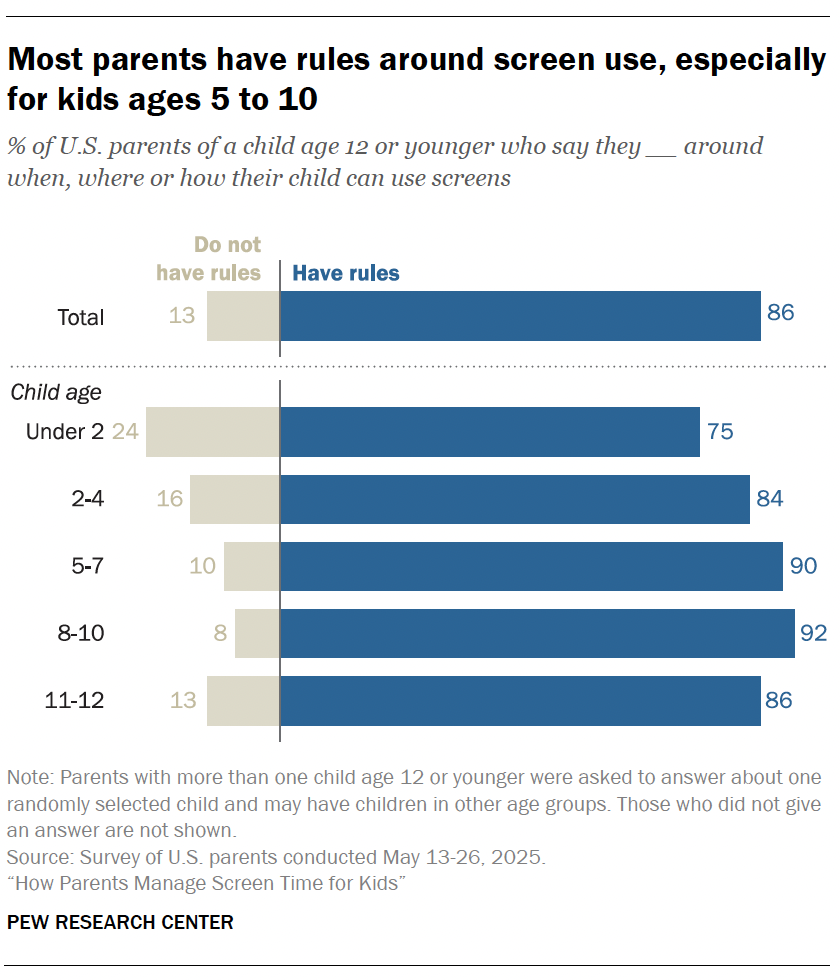
The vast majority of parents (86%) have rules around when, where or how their child can use screens, according to our survey.
About one-in-ten say they have no rules around screen use.
By child age
Although majorities of parents have rules around screens, some differences exist by child age. Roughly nine-in-ten parents of a child age 5 to 7 or 8 to 10 say they have rules in place around screens. This drops slightly for those with kids 2 to 4 or 11 to 12. Parents are least likely to say they have rules for kids under 2, but still, 75% of parents with a child this age say so.
Sticking to their rules
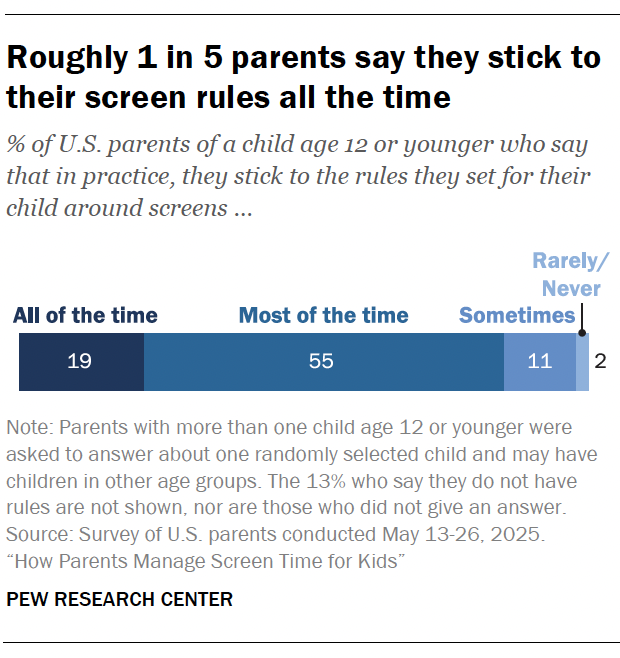
In practice, fewer parents are able to stick to their rules around screens all the time. In fact, roughly one-in-five parents say this. The largest share – 55% – say they stick to their screen rules most of the time.
Another 11% say they sometimes do, and 2% rarely or never stick to these rules.
In the focus groups we conducted, one parent described how hard it is to stick to some of the rules they set, saying, “We cut off all screens an hour before bedtime. … No screens on schooldays. Nothing immediately in the morning … We try to do nothing at the table, but we fail on that quite frequently, to be honest, like during mealtimes.”
Others noted how rules can be a struggle in general, with one parent saying, “I just feel like, when you restrict a kid from something, they want it more.”
How do parents think their parenting compares with others?
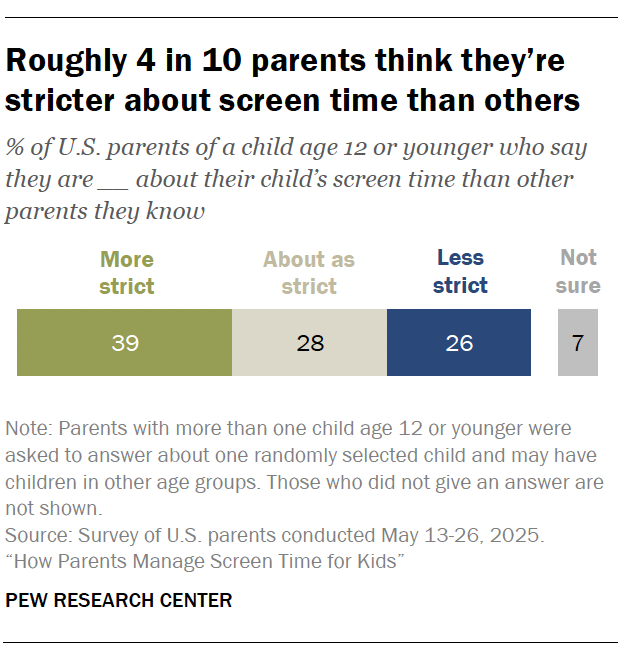
In our survey, parents lean toward seeing themselves as stricter on screen time than others.
- 39% say they are more strict about screen time than other parents they know.
- 26% say they are less strict.
- 28% think they’re about as strict.
What parents think about their own screen time
The struggle with screen time isn’t just limited to kids; families are navigating this issue together. Experts are sounding the alarm about how parents’ own tech use may impact kids. But parents pulled in many directions can’t always avoid their own devices.
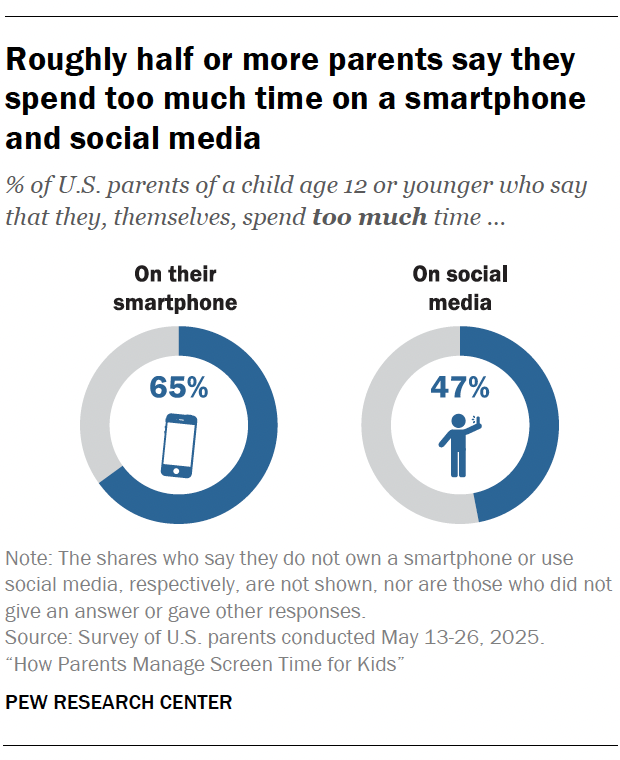
In our survey, about two-thirds of parents say they spend too much time on their smartphone (65%). And roughly half say this about their time on social media (47%).
Much smaller shares say that they spend too little time on their smartphone (5%) or social media (8%).
Still, some parents feel comfortable about their time spent on these. Roughly a third say they spend about the right amount of time on social media (36%). About three-in-ten say the same about their smartphone (28%).
The struggles of navigating screen time as a family were also a topic of discussion in our focus groups. Some parents talked about trying to set an example and how their own habits shaped their household.
As one focus group participant explained, “I also have been pretty bad at monitoring myself because I always have my cellphone in hand. Even when I’m sitting with my kids, watching over their homework … so lately, I have turned my phone in airplane mode, to make sure I don’t hear any sounds, notifications coming out.”
Another said, “When it’s time for dinner, I try to put my phone away. And it’s a bad habit that my daughter and my son, they like to have their devices out. But I try to tell them when we’re eating, we need to just eat, and we need to put the devices away.”
By parent age
Younger parents stand out in saying their screen time is too much in our survey.
This is true for smartphones (66% of parents ages 18 to 49 vs. 46% of older parents) and for social media (48% vs. 27%).
By parent race and ethnicity
Smartphones: 72% of White parents say they spend too much time on their smartphones. Smaller shares of Asian (61%), Black (59%) and Hispanic parents (54%) say the same.
Social media: White (50%) and Black parents (49%) are more likely than Hispanic (40%) and Asian parents (39%) to say this.
By household income
Smartphones: About seven-in-ten parents living in upper- (71%) or middle-income (69%) households say they spend too much time on their smartphone. This drops to 58% among parents with lower incomes.
There are no meaningful differences by household income for those who say they spend too much time on social media.
What parents want from tech companies and lawmakers
As kids spend more time online, technology companies have faced pressure from lawmakers and advocates to do more to keep children safe. And lawmakers themselves are facing criticism for not doing enough to protect kids.
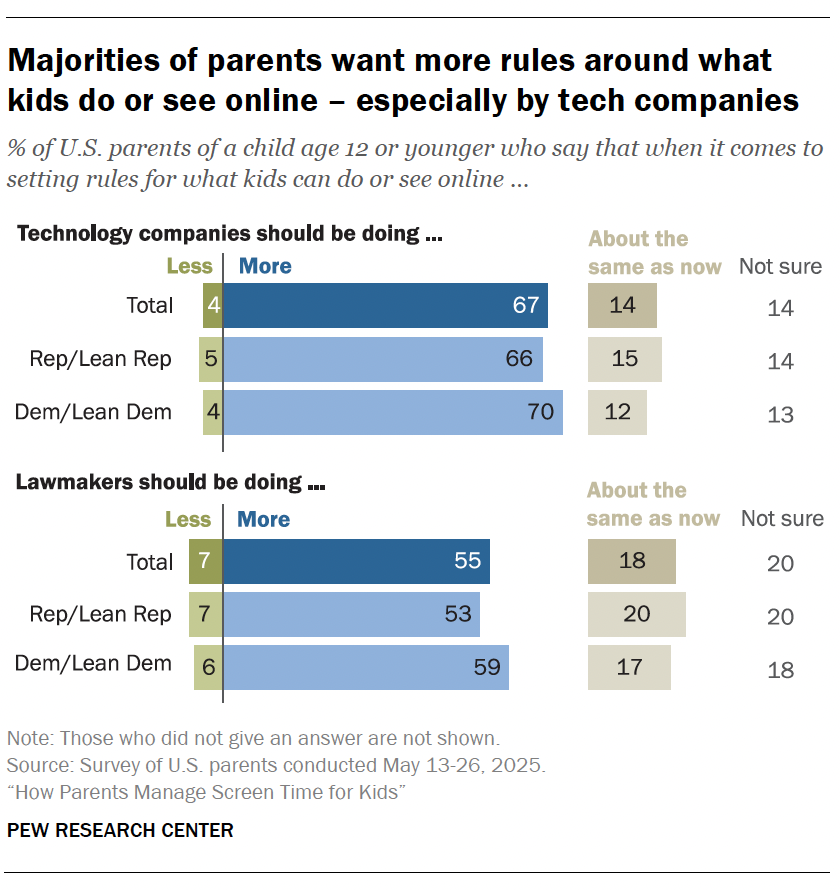
Our survey finds that a majority of parents say tech companies and lawmakers should do more to set rules for what kids can do or see online.
Asked about lawmakers, 55% of parents say they should be doing more. And a larger share (67%) say so about technology companies.
In both cases, far fewer say tech companies or lawmakers should be doing less than they are now – or that they should stay the course.
A desire for increased rules and regulations around minors online is not new. A 2023 Center survey showed most U.S. adults were supportive of policies such as parental consent, age verification requirements and time limits for minors on social media.
By political party
A large majority of parents in both parties say tech companies should be doing more for kids online:
- 70% of Democratic and Democratic-leaning parents
- 66% of Republican and Republican-leaning parents
Slightly fewer in each party think lawmakers should be doing more. Roughly six-in-ten Democratic parents say this, versus 53% of Republican parents.




